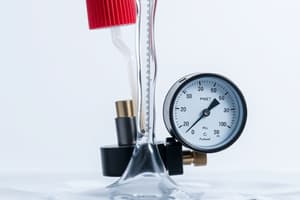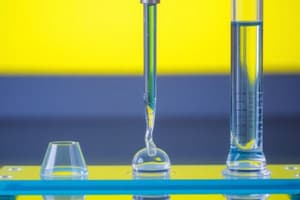Podcast
Questions and Answers
What is viscosity a measure of?
What is viscosity a measure of?
- A fluid's ability to conduct heat
- A fluid's ability to change shape
- A fluid's resistance to flow and deformation under stress (correct)
- A fluid's ability to absorb light
What is the unit of viscosity in the International System of Units (SI)?
What is the unit of viscosity in the International System of Units (SI)?
- Meter-per-second
- Joule-per-kilogram
- Newton-meter
- Pascal-second (Pa s) (correct)
What is the effect of increasing temperature on the viscosity of a fluid?
What is the effect of increasing temperature on the viscosity of a fluid?
- It decreases the viscosity (correct)
- It depends on the type of fluid
- It increases the viscosity
- It has no effect on the viscosity
What is one of the medical applications of viscosity?
What is one of the medical applications of viscosity?
What is the name of the law related to the viscosity of a fluid?
What is the name of the law related to the viscosity of a fluid?
What is the terminal velocity of a sphere falling in a fluid?
What is the terminal velocity of a sphere falling in a fluid?
What is the formula for the viscosity force of a sphere falling in a fluid?
What is the formula for the viscosity force of a sphere falling in a fluid?
What is the purpose of this experiment?
What is the purpose of this experiment?
Flashcards are hidden until you start studying
Study Notes
Experiment: Viscosity of Liquid
- The experiment aims to determine the viscosity of a medium using a small sphere falling with a constant velocity.
Viscosity: Definition and Units
- Viscosity is a measure of a fluid's resistance to flow and deformation under stress.
- It is a fundamental property of fluids that determines how easily they move and their ability to transfer momentum.
- The units of viscosity depend on the system of units used:
- In the International System of Units (SI), the unit of viscosity is the pascal-second (Pa s).
- In the British system of units, it is the poise (P) or centipoise (cP).
Factors Affecting Viscosity
- The factors that affect the viscosity of a fluid include:
- Temperature: generally, an increase in temperature decreases viscosity.
- Pressure: generally, an increase in pressure decreases viscosity.
- The presence of impurities: increases viscosity.
- The size and concentration of particles in suspensions or solutions: generally, an increase in size and concentration decreases viscosity.
- Intermolecular forces: greater intermolecular forces increase viscosity.
Medical Applications of Viscosity
- Viscosity has several medical applications, including:
- Measurement of blood viscosity, which can be used to evaluate the risk of cardiovascular disease, stroke, and other circulatory disorders.
Studying That Suits You
Use AI to generate personalized quizzes and flashcards to suit your learning preferences.




